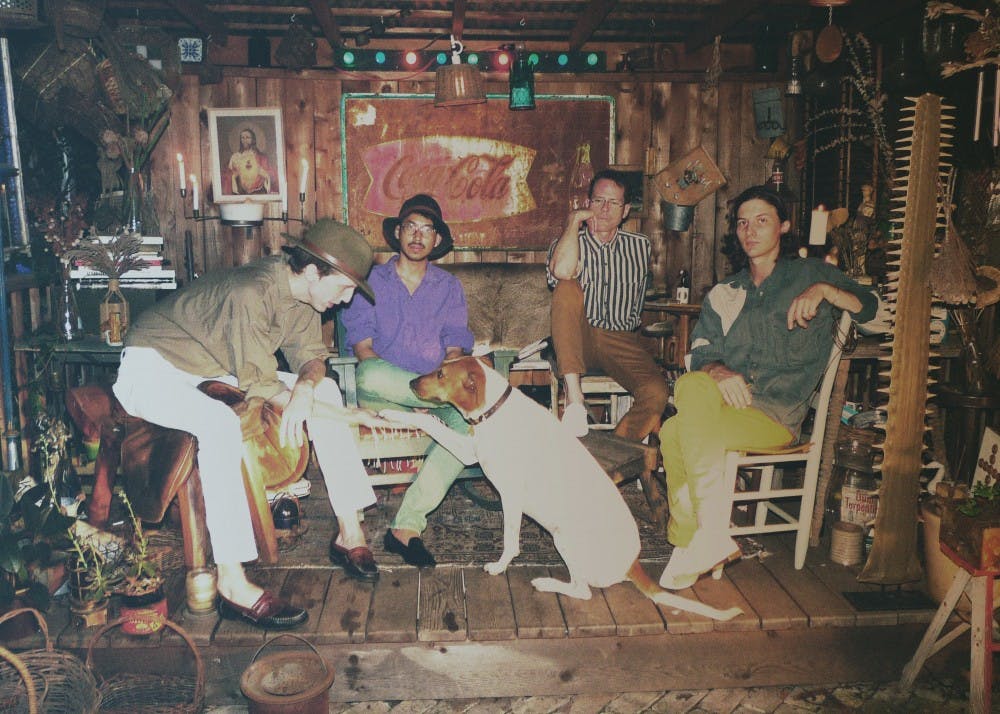Deerhunter is almost impossible to pin down. With influences coming from everywhere on the musical spectrum, the Atlanta band’s sound has evolved from fuzzed out post-punk on their debut Turn It Up F***** to gentler indie rock on Microcastle to psych-rock and dream pop on 2010’s widely acclaimed Halcyon Digest. It’s hard to say what their next album album will draw from, and after the dark tones of 2013’s Monomania, the sounds coming from their latest album are even more unexpected than usual.
Their newest album, Fading Frontier, is Deerhunter’s most accessible album to date, and the influences are easy to trace. Bradford Cox, the band’s charismatic lead singer and frontman, has cited alt-rock progenitors R.E.M., dad-rock staple Tom Petty, new wave INXS and Tears for Fears as having an impact on the creation of the album—in addition to “the decline of the music industry, Pablo Neruda’s “Isla Negra,” and “souless new car smell” (sic)—but the most prominent defining thread of the album is the theme that connects all Deerhunter work: eventual death, and the escapism and freedom from the dull day-to-day of life.
The album starts with “All the Same,” which starts with ringing guitar interplay that could almost be lifted straight out of a Real Estate song, although the crunchy and echoing drums and aggressive singing quickly set it apart. The lyrics immediately discuss the boredom Cox faces and touch on leaving it all behind, though not through death as previous Deerhunter songs might suggest: “My friend’s dad got bored / Changed his sex and had no more / No more wife, no more kids / Nothing left to live with.”
The theme of independence and freedom comes from the car accident Cox experienced in the winter of 2014, which left him hospitalized and put him on drugs which made him “feel outside society,” a feeling he relishes. The album emphasizes this with frank songs such as “Living My Life,” which starts with ethereal synths and drum machines and breaks into jangle guitar pop and features Cox singing about living “off the grid” and being “out of range.” Despite the platitudes, the song comes off as sincere and heartfelt.
The songs continue the themes of going with the flow and living life, touching on the ever-present morbidity Deerhunter is known for: “Breaker” has Cox and guitarist Lockett Pundt singing about eventually being remembered as someone who “tried / Not to waste another day / Trying to stem the tide.”
The wide range of musical influences carries through to the milder midsection of the album. The waltz “Take Care” starts with pulsing drum machine and synth work and explodes into expansive slide guitar and fill-oriented drum bridges featuring skyward keyboard lines, while the languorous “Leather and Wood” is vintage Deerhunter with single piano notes grounding Cox’s meandering vocals until computerized blips end the song.
“Snakeskin” kicks off the beginning of the album’s close, with alternating major and minor guitar chords over ratcheting drums which sound like they could be lifted straight off of a Juanes record. Almost danceable, it’s more upbeat than any song on the rest of the article, and the closing verse makes the most obvious allusion to Cox’s accident, where he sings about being trapped and sick in “that home for the aged and lonely.”
The mellow “Ad Astra” apes Washed Out’s chill wave as Cox sings about some kind of otherworldly experience, and then closes with a bizarre sample of Bascom Lamar Lunsford’s “Mole in the Ground”, which is explained in the final song. The album closes with “Carrion”—a decidedly Deerhunter-esque title—but manages to turn the word its head into “carry on” as Cox sings about digging into the ground like a mole until he digs too deep and can no longer see. The song devolves from clean guitar licks as signature Deerhunter fuzz and reverb play into the song more and more as Cox’s singing gets angrier and angrier as he questions himself: “What’s wrong with me? What’s wrong with me?”
The relatively brief nine track album echoes everything and nothing as Deerhunter manages to work almost all the sounds for its benefit, with only “Leather and Wood” falling flat in its lethargy. With Deerhunter, nothing remains the same for long except for Cox’s death-tempting and inscrutable lyrics, yet the group still manages to churn out compelling records leaving the listener wanting more.
Get The Chronicle straight to your inbox
Signup for our weekly newsletter. Cancel at any time.

